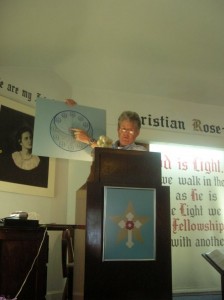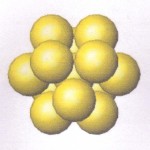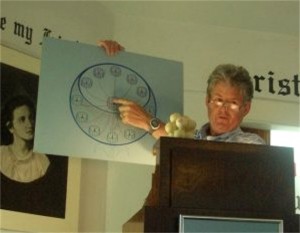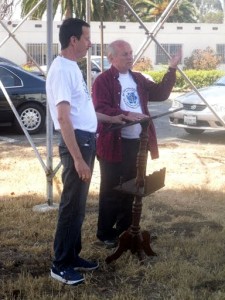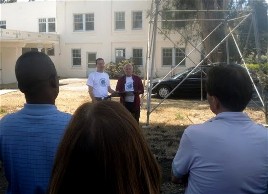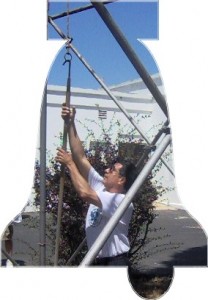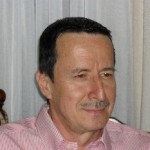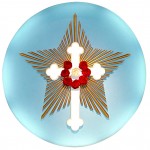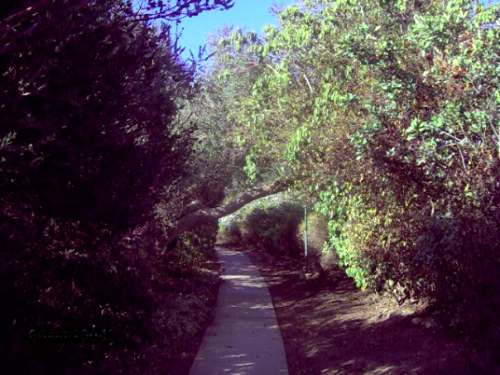OUR WORK
A Lecture Given At The
Detroit, Michigan, Conclave
September 2009
By Richard K
In the Rosicrucian Order and with the Rosicrucian philosophy, we are tapped to challenge, because when we challenge, we learn the truth from experience. Therefore, I am now going to challenge you. I challenge you to remain awake. It’s that kind of a talk. I once heard that if you’re going to be a speaker, it’s good to do something that helps people to understand your very human qualities. What I like to do is make a confession of some sort. The confession that I have to make is that I am a Rosicrucian fundamentalist. So, what this talk is going to be is fundamentalism. It is about Our Work. Most of the talk is introduction, and nothing is exciting in it at all.
As above, so below: What has gone before in heaven will follow after on earth. Know this and rejoice. That is a statement from a teacher in very ancient Egypt, called Hermes Trismegistus. Max Heindel was a twice-born Hermes. Not only was he a twice- born, he was a thrice-born. Max Heindel, in his writings, called it the hermetic axiom. Other people call it “the principle of analogy.”
In the vertical pole of creation, the principle of analogy is how unity is maintained, because from the deepest spiritual realms, through the more and more material realms, on each plane things are analogous. In that analogy the unity of the oneness of the universal spirit is maintained. That’s a very, very important thing to us.
Some of the ancient mystery schools, like the orphic mystery schools of the Pythagoreans, especially the Platonists – they actually believed that this was how the universe was created – that while using the principle of analogy from within, the universal spirit differentiated each of the different planes. It was expressed by a member of The Rosicrucian Fellowship in a book called The Creative Word and It’s Undertones. Like in music we use “overtones” but actually it is the other way around in the great cosmic creation. It starts out with the one word and within that there are undertones and those become the basis for the different worlds.
Everything in the divine plan, the scheme of evolutionary creation, is analogous. For example, it’s in our lives. In the first seven years of our life we recapitulate both the Polarian Epoch and even earlier times when we were mineral-like. If a little child hurts its body, its whole being has been challenged because it is in the mineral state.
A little later on, in the second seven years when the child grows very rapidly, that is a recapitulation of the Hyperborean Epoch and a still earlier time in the Sun Period when we went through a plant-like existence. One of the worst things you can tell a child at that time is, “If you don’t eat your veggies you’re not going to grow.” The identity of the child is in growing.
Between 14 and 21 it is an analogous recapitulation of Lemuria and the earlier Moon Period, so, everything in our lives is analogous to what we have done before, and by all the repetitions on the grander and grander scales we awaken our consciousness. Even the second half of our life is analogous to the second half of the evolutionary creation. In the second half of our lives we look back more, and the more that we look back, the more our bodies go into disintegration and we take the soul stuff into our being so that we’re much, much more soulful after we have looked back on our experience. All of these things are analogous.
It is with great wisdom that the Elder Brothers of the Rosicrucian Order made all of their exercises to be based on these same principles. When we awaken in the morning, the first thing that we do is we concentrate on the early verses of St. John’s gospel.
In the beginning was the Word, and the Word was with God, and the Word was God. The same was in the beginning with God. All things were made by Him; and without Him was not any thing made that was made. In Him was life; and the life was the light of men. And the light shineth in darkness; and the darkness comprehended it not.
So, what we do in our exercise is we follow the Word right into our daily life. In the evening when we retire, we look at our day backwards. We withdraw the essence of the day and carry it into our spiritual being, and we leave the body free and clear. So, everything, even our exercises are based on the same principles that are used in the cosmic creation. We learn that everything in the creation is spiral, and the spiral is a way that the analogous thing can be delineated through time. It’s not just a circle where you go through the same circle again and again, but there’s always a little bit of progress, and each new circle is a little bit different, but there is something analogous. And there are spirals on other spirals until it is all within the one individuality or the one spirit that creates it all.
Now, we as students and probated people of The Rosicrucian Fellowship are told to do things analogous to nature. We’re taught that at the turning points, for example, at Christmas which is the true New Year, (before they got the calendar screwed up) we’re taught to look back at our year and to make resolutions for the New Year. The same thing at the Vernal Equinox and Summer Solstice and the Autumnal Equinox; so every time that there is an important point, that important point is a moment that determines the difference between the past and the future. We draw on the past and we resolve and carry things into our future with our spirit.
Now we are at a very important turning point in the Rosicrucian Fellowship work. Our organization is now 100 years old, and we have been given a charge to carry the Rosicrucian work forward in the service of Christ. That is our work. When we look back at our lives at night, we don’t do that in a nebulous way. We look at it according to very clear objectives. We don’t just say I had a good day today or I had a bad day today. We ask, was I loving to that person? Or, did I really strive to do what I should do? So, we are specific relative to aims, objectives, and purposes. So, what we want to do as we are looking at this century turning-point for The Rosicrucian Fellowship is look at the aims, purposes, and activities of The Rosicrucian Fellowship to see whether we have done well or have not done well, at least to clarify in our minds what we’re doing. It’s very easy to get carried away in our things that are our own things, and they might be very good things, but if they’re not what we have intended to do and what is most important to do, we’re not doing the best that we can do.
The Rosicrucian Fellowship, which emanated from The Rosicrucian Order which is a completely inner organization, has very specific objectives. So, the purpose of this talk is, in the simplest way possible, and the most fundamental way possible, to review some of what those objectives are. And if we are not in line with those objectives with our lives, to re-attune ourselves, just like he tuned that instrument, so that we are re-attuned to what we’re supposed to do. You know, this is not something where we just do our own thing.
Max Heindel, the founder of The Rosicrucian Fellowship, was very dedicated in that way. He could have taught all kinds of things, and he could have given us all kinds of scientific knowledge and things like that, but he didn’t do that. He worked off the Bible verse, “Seek ye first the kingdom of heaven and all of this will be added unto you.” He didn’t indulge himself in being that grateful liberator. He did what was asked of him, and that was to teach the Rosicrucian philosophy, and he did not put personal ambitions in the way of doing that.
The official title of The Rosicrucian Fellowship is An Association of Christian Mystics. Another name for The Rosicrucian Fellowship is A Spiritual Service Organization. It follows the admonition of Christ, “Who would be greatest among you, be ye the servant of all.”
In both, the definition and the statement of activity, the word, Christ or Christian is used. The basic philosophy of The Rosicrucian Fellowship is Christian. It does not contradict biblical Christianity, and it is in agreement with most of the tenets of most of the denominations. But, that said, the Rosicrucian philosophy does not exclusively rely on the New Testament for its Christian basis.
The claim is that those who are initiated and those who are the teachers of the Rosicrucian Order, from the inner worlds, research with their own scientific spiritual observation, and working under the commandment of Jesus or under the commandment of the Cosmic Christ, that all of the philosophy that they bring forth is a statement of reality about the nature of the cosmos from a Christian point of view. And the Christian point of view is very different. There are a lot of philosophies that are like the Rosicrucian philosophy that go way back into history, but they do not have the attitudes that were brought to us by Christ, and this is something that we have to stress here in all of this work.
I can’t go into the whole Rosicrucian philosophy, because that would be too much, but the very few things that I’m going to state are going to be stated in terms of biblical Christianity. The basic statement or the basic commandment that comes from Christ Jesus in the Bible is that the work is to preach the gospel and heal the sick. That is our work – to preach the gospel and heal the sick. Now that’s a very direct statement, and it’s kind of hard to shirk doing that, but we seem to do it.
If we look at the testament of the Bible, it’s clearly not an ….?…. book. There are parables that can be interpreted many different ways; there are stories; there are all kinds of things – it even says in there that some of the teachings were only for the disciples and not for the masses. It doesn’t mean to be elitist, but it means to say that some people have prepared themselves more so they can reach and receive the teaching that comes straight from Christ. It says that there are mysteries, but it also says that the mysteries that have been the foundation of the earth will be shouted from the rooftops.
Now I’ve got to be really careful here, because Thomas knows the Bible almost by heart and if I misquote, just come and tell me later on where I ….(laughter) There are statements from Christ that says that the kingdom of heaven is at hand. But what does that mean? Does that mean at hand in time? That’s what most people take it to mean. But the kingdom of heaven is at hand in space, because it’s closer than hands and feet, so all of these things need interpretation.
If what we teach is correct, the ultimate authority is our experience. What we do not know, and what we do not have from direct experience, we always refer to Christ. The only way we can tell is the very way that the Bible tells us. “By their fruits ye shall know them,” and it goes on to describe the fruits of love and all of the qualities that we as Christians are supposed to be. We are supposed to be people who love, not because we’re supposed to love, but because we love. To love lives in us, and if Christ does not live in us, there’s nothing much that we can really do.
What is the gospel that we’re supposed to teach? Obviously, what we are to teach is something that enlightens people and helps them to live better lives, helps them to live in harmony with the cosmos in which we live, so that they can be receptive to the spirit of truth coming to them and they can live and give to creation as part of their lives. So, our work is loving, self-forgetting service. It’s very fundamentalistic – loving, self-forgetting service.
It means that we sacrifice our ego-nature for the sake of the truth. It’s something that we usually only hear as curse words – as mention of the Christ, we sacrifice our ego, our self when we give that over to Christ, which is the self of all selves, you might say the selfness of the universal spirit, and that is our work. This is what we are here to do. We’re here to teach love.
Nineteen hundred years after the crucifixion of Christ, the Elder Brothers of the Rosicrucian Order, who have been spending hundreds and hundreds of years with their seer-ship, investigating the spiritual worlds, came to a philosophy which was given to the world through Max Heindel. This was given in accordance with the will of Christ. We have to trust them in saying that this philosophy is according to the will of Christ. It doesn’t contradict anything of Christianity, and it is filled with love and truth and all of those things, so maybe taking it on trust is not a hard thing to do. Intuitively, I believe that the teachings are something that we can accept quite easily.
Let’s look at some of the evidence to determine whether the Rosicrucian philosophy applies and is an extension of the gospel and if it is something that carries out the work of Christ. The first has already been mentioned and must always be re-mentioned. We are in no way contradictory to Biblical Christianity. In all cases it extends Christianity. We have a Bible course, and in that Bible course, explanations are given that open up a lot of passages of the gospel. They are very, very opening. They are very philosophical. They help us to live better lives because of their truth.
I came to the Rosicrucian philosophy when I was an atheist. By studying the Cosmo-Conception and then seeing Bible interpretations that made sense to me, that answered my intuition and [appealed] to my heart, I found that I could accept everything of Christianity that I couldn’t take before from what I called cookie Christianity. I called it cookie Christianity, because I came out of the Methodist Church, and it was my nature to ask a lot of questions, and every time I would ask a question that wasn’t within the accepted theology, they would say, “Here’s a cookie.”
It [this philosophy] answered all of those things, and there is nothing new about the Christianity, I think that some of the churches make grave mistakes, (and I think some of them teach a doctrine that is anti-Christian) but nonetheless, I can be completely pro-Christian about all religions, because I can see that in their own way, even though they misinterpret things they make the world a better place and that is a positive, forward-moving thing.
The whole idea of verification (this is something that I and, I think, other people of The Rosicrucian Fellowship get wrong) is we become complacent and we accept much. We read the Cosmo-Conception and the other works of Max Heindel, and we intuitively know the truth is in there. But, we do not continue to question, and we do not continue to question our own knowledge of those things that we intuitively accept as true.
If you look at the very first edition of the Cosmo-Conception, right on the title page it quotes from the Bible. It says, “Try all things.” And this is the spirit that we should have. We should constantly try things and constantly test things, because that is what they are brought for – life. The philosophy of the Rosicrucian Fellowship cannot do us any good except if we can live it. We know the truth, but applying it is the way we live the truth, and in that we have the testament of both the Bible and of the Cosmo-Conception. We have a good way to test our own progress.
If we go back and read the gospels, or if we go back and read the Cosmo-Conception, and we find a passage and we say, “I never knew that was in there,” it’s like it’s a new book. The book is not new, we are new. This is an example of the fact that we have grown spiritually. If we read it and it’s the same old, same old, that means that we have gone stale. We haven’t tried to test this to see whether it really works.
That was really a wonderful story that he told about bringing the heart into the classroom, because you tested it and you tried it and you put it to work, and it worked. That’s what we’re supposed to be doing. The most important thing for us is preaching the gospel, and the question is, how do we do it? The first way that we do it is we live our lives. What happens when we get involved with things – like initiations and trials to become disciples and things like that – is people read about these trials and they think that’s all something artificial. You’re going to get a test, and when you pass that test you’re going to think you’re something glorious.
That’s not the way it is. This is about reality. It’s not a dress rehearsal. This is the real thing. To the degree that we live it in our life, we bring up our own trials. What our character is is reflected back to us by the cosmos. This is what cause and consequence is. As you sow, so shall you reap, and the way we deal with those trials is how we move forward, but really it’s not something apart from life. A trial is just the amplification of life. It is an amplification to see if we can live life in a more intense way – to see if we can live life at a higher and a better level.
If we can’t live it, we just go on as we are; it doesn’t mean we have dire consequences like being thrown in the furnace or anything like that. It just means that we live our same, dumb old life. I once applied for discipleship and it took me half a year before I realized that that event that happened there was that trial, which was just part of life. You know, events are the things that are repeated by Christ in the gospels and are the things that are the most important. One of the things that is repeated is, “It cometh as a thief in the night.”
The spiritual life is not going to be only spectacular – it’s not going to be like a fireworks demonstration; it is more and more subtle. We become progressively more subtle, so that we can see through – that’s what initiation means. It means seeing through, seeing clearly so that we can see through the denser and grosser things of life to the finer things behind. You cannot force your way; you cannot take heaven by storm. You develop the subtlety and live your way into it by living a more subtle life. It might be that right within this room there might be initiates, because they don’t go around with name tags, Hi, I’m Richard, I’m an initiate. It isn’t like that. Some people have the insights and they live, uh, probably it’s in the way that they live.
Now, Max Heindel was chosen to be the messenger, because he lived that kind of life. He lived a life of integrity; he lived a life of service. He gave it everything that he had. There is no substitute for character. A person can be intellectually brilliant, artistically creative, but if they don’t have moral and spiritual character, they are not fit to be a teacher. In fact when Max Heindel formed The Rosicrucian Fellowship he was told only to associate with people of good character.
Now, all of this brings up yet another distinction that needs to be made. That is, Max Heindel is something of an ideal to us, not the ideal that Christ is, but how do we serve – our loving, self-forgetting service? It doesn’t necessarily mean that we’re all going to be Max Heindel’s. It doesn’t mean that we’re all going to be great leaders or founders or anything like that. We’re told very clearly that we serve or that we minister according to our own talents. We don’t try to become somebody we aren’t.
We take what we are and we carry it forward and we make something better of it. And because we all have the spirit – the one universal spirit in us, we all eventually become Gods. In this process, there is no substitute for good, sound judgment.
So, if we are preaching the gospel, whether it be the Cosmo-Conception or whether it be the Biblical gospels, we have to realize that this is a creative art, especially when we’re dealing with people who are new to this. Somebody was saying, “What is this? There are not many young and new people in the churches right now; it’s all older people.”
Part of that is due to the fact that older people are more soulful, because they’ve suffered more in life, and they’ve had their rough edges hammered off and maybe they’ve been very much humbled. But part of it is that people are going to come to Christ in a new way. I know people who almost know the gospel by heart. I have one friend who reads the St. John’s gospel once a day. But the Bible may not be the way of the future.
If we look at the Bible and we look at, relative to what the old prophets said and compare that now with science, it’s very anachronistic. And so if we take something like the Bible, or if we take something like The Rosicrucian Cosmo-Conception, it is our duty to use good, sound judgment to state it in words that exactly – that come from us and that are perfectly attuned to the person that we’re talking to.
There is Biblical testament to that with what Saint Paul says – to be many things to many people. We are the ones who are supposed to be more expansive people, and we are the ones then that should be able to adapt ourselves and be able to bring truth to other people in their own way. It’s all about words. We are all told not to be …(??)… And we just don’t quote. People don’t want to hear just quoting again and again. They want something live from people. It’s more like birds that have little ones in the nest. They go out and they get worms or bugs or whatever and they partially digest it, and then they feed the little ones that way. That’s the way the Rosicrucian philosophy should be for us. We should digest it, and unless we can say it in our own words, without having to rely on technical terms—this is one of the things I do a lot with astrology, I teach a lot of astrology, and any time you’re doing astrological work and you have to use an astrological, technical term, you have failed. If you can’t say what you have to say in English in a way that you can explain it to someone, then you’re stuck in a technical jargon. You’re not clearly being helpful in that.
Knowledge What we’re talking about with the Rosicrucian philosophy – the Rosicrucian philosophy is not for everyone. I would almost like to get everyone to say that. “The Rosicrucian philosophy is not for everyone.” It’s for people who need explanations in order to follow their heart. It’s for people who – you might call it “egghead Christianity.” It’s for people who are way too mental and who are way too involved with technical, scientific things, and they’re so far away that their heart is starving to death. And some of them can be pretty obnoxious people. I was pretty obnoxious. I was a vociferous atheist when I was an atheist. One person said, “Well, where is your book for atheism?” That is a symptom. If someone is an obnoxious, vociferous atheist, that’s a symptom of the fact that your heart’s starved. They’re looking for something more, and you probably know, working with some of those kids, the ones that are the toughest ones are the ones that have the greatest emotional inner needs, and if you can get through all of that……….So this is what we need to do with the Rosicrucian philosophy or with just sharing Christianity, is we need to be able to use good judgment.
Sometimes we talk only about one simple thing, and that’s all that a lot of people need. Donald Finch spent most of his life talking about one principle, the principle of cause and consequence which he stated in a different way. He just kept working on it until people got the idea from himself and when they got the idea for themselves, their lives were better. Most important of all, when we’re applying good judgment about how we teach, we don’t try to impress other people intellectually, because that’s almost like slugging them. You’re just putting out words and principles and concepts; that’s not what Christianity is. Christianity is a religion of love; it is a religion of forgiveness.
I don’t know if I’m practicing it, but I’m trying to practice it, even on the highway. You know, when people are coming into a lane that they’re not supposed to be in, and you say, “I’m not going to let him in there,” it’s still a challenge for me. You know, sometimes that “still small voice” tells me “you’ve got to let him in there, because you’re giving him a break even though he doesn’t deserve a break, and that is what grace is. Grace is when we get a cosmic break even though we didn’t deserve it, when we were sinful, selfish, uncaring people.
And if we are carrying light, some people won’t even accept it. So, unless what we’re teaching – you know, you can teach nothing but cause and consequence, and you can be a hard-nose about it; that’s not Christianity. Christ said, “I came to fulfill the law,” and Christ superseded the law, so that when we are preaching the gospel, which is the first one of our objectives, we do it with an attitude of Christ. If there are sophisticated arguers and they try to make a fool of you, so be it. You know, it’s no different than being sucker-punched into a fist fight. It’s just done intellectually, but you have to love them no matter what.
We have only a few minutes to talk about the second thing that is our work. That is to heal the sick. It’s very important right now. It is the way humanity advances itself the most. In the Bible, Christ tells us it is more blessed to give than to receive. That’s a strange notion. If you take that in a small scale of time, that disrupts the whole idea of cause and consequence or action and reaction. You have to look at it in a deeper and more far-reaching way.
What you do is you see that as the whole first half of the whole evolutionary creation. It is a creation; it’s not just an evolution like a machine; it is the creation of the universal spirit. In that whole first half, when we were creatures, we were receivers, and we advanced ourselves by receiving what the angels, the archangels, and all the other hierarchies were giving to us. Now that we have taken the creative force into our own hands, even though we’ve jumped the gun in what is called “the fall of humanity,” now that we have taken that creative force into our own hands, we are now among the creators, and for the whole second half of the creation, we are the creators, which means “givers.” It is more blessed to give than to receive. I believe that this is what Christ was pointing to when he made that statement—like we are becoming creative beings.
But, that ignores the fact that we have this large burden of sin. And we have this great distorted character and personality from many, many past lives of sinning. So, what the spirit is works its way out.
Bad thoughts lead to bad desires. Bad desires lead to bad actions, and bad actions lead to sick bodies. If we’re going to become creative beings, our first work in creation is regenerative. By that we use our creative abilities to help others be uplifted. This is why healing the sick is put on the same level as preaching the gospel.
In fact, they actually are both the same thing, but the Rosicrucian philosophy has a wonderful healing practice. It has a service that is designed to put us in touch with Christ and to draw on the healing energy of Christ to bring it down to where it can be used here on this plane and shared with other people. Moreover, through the use of astrology and other things, we understand what is wrong in the character so that in spiritual healing, when we try to help people with their attitudes that have degenerated, the healing may not always be a dramatic laying on of hands – it might be bringing an understanding to someone that they need to change their life forever. When we heal the sick, we study, not with an idea of knowing things, but to know things that can help people, and that we then can help heal them.
Now, in the Rosicrucian Order and with the Rosicrucian philosophy, as we said in the very beginning, we are tapped to challenge, because when we challenge, we learn the truth from experience. First hand experience is very, very important in the Rosicrucian philosophy. Healing prayer is probably the best way to get first-hand experience. You have heard these stories of people – of fakir’s in India who sit and concentrate and they put a seed in the ground and you see the tree come up and then you see the fruits come off of the tree. Madame Blavatsky who was a deep student of Eastern philosophy said “those are the dropouts.” She said those were the people who only worked on concentration or psychic phenomena.
They said, “Look at what I can do,” and they got all fascinated with that, and they didn’t use it for service. If we want to develop our inward powers, especially the power of concentration, there is no better way to develop concentration than to do healing prayer. At the same time that you’re developing your talents and your abilities, you’re helping people. If you give it over to their free will and in accordance to Christ, you’re helping people without sticking your nose in their business.
I’m very strong about this. I’ve made several ventures in life. I’ve made some success in S. America, not so much in N. America, on getting people to do the healing service on a regular basis—on forming core healing groups that are like teams, that you work together and that you know because of each other that your prayers are stronger and that you can be much more effective. As far as trying to grow as Christian mystics, I can’t think of a better way than to participate in the healing work. It’s practical, and it’s down-to-earth and it’s the best way to develop your talents. That’s about all I have to say, so we’ll close with the Rosicrucian Student’s Prayer.

